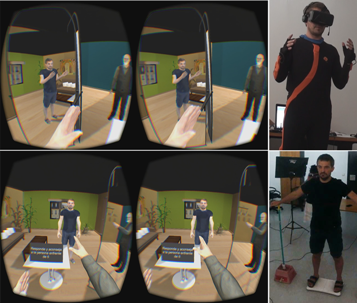Dialogue with Freud avatar boosts mood

Most people silently talk to themselves in order to help resolve personal problems. A research team at the University of Barcelona has used immersive virtual reality to observe the effects of talking with oneself by means of two avatars (virtual representations). Study results, published in the journal Scientific Reports,of the Nature Group, show that conversation with oneself improves peopleʼs mood, particularly when virtual conversation is held with an avatar different from the participant, in this case with the body of Dr Sigmund Freud. Researchers affirm that the method could be used to help people dealing with minor personal problems by seeing things from other perspective.

Most people silently talk to themselves in order to help resolve personal problems. A research team at the University of Barcelona has used immersive virtual reality to observe the effects of talking with oneself by means of two avatars (virtual representations). Study results, published in the journal Scientific Reports,of the Nature Group, show that conversation with oneself improves peopleʼs mood, particularly when virtual conversation is held with an avatar different from the participant, in this case with the body of Dr Sigmund Freud. Researchers affirm that the method could be used to help people dealing with minor personal problems by seeing things from other perspective.
The study was developed by Sofia Adelaide Osimo, Rodrigo Pizarro, Bernhard Spanlang and led by Mel Slater, researchers at the Experimental Virtual Environments Lab for Neuroscience and Technology (Event Lab), a research group of the Faculty of Psychology of the University of Barcelona.
In the first phase of the experiment, participants embodied a virtual body that seemed to their own body. They perceived similarity by looking to body parts and seeing their image on a mirror. Moreover, the virtual body moved in synchrony with the movements participants made. Participants had to explain their personal problems to a virtual representation of Dr Sigmund Freud that was in front of them. The figure of Freud was selected after asking participants not involved in the study what popular person they would choose to speak about a personal problem.
One week later, the experiment was repeated. Instead of seeing Freud, participants saw a copy of themselves at the front side of the virtual room, so they had a virtual conversation with themselves.
Article reference:
S. Adelaide Osimo, R. Pizarro, B. Spanlang and M. Slater. «Conversations between self and self as Sigmund Freud—A virtual body ownership paradigm for self counselling». Scientific Reports, setembre de 2015. Doi: 10.1038/srep13899
